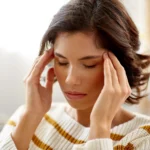Risk Factors for Depression in Women
Various biological, hormonal, and social factors contribute to the higher prevalence of depression in women. Women are often more susceptible to developing severe depressive symptoms due to these unique experiences. Key stages in a woman’s life associated with certain types of depression include:
- Pregnancy
- Postpartum period
- Menstrual cycle
- Perimenopause
Big life changes and negative experiences, such as physical or sexual abuse, can also contribute to the higher risk of depression in women. Understanding these psychological factors can help in identifying and addressing depression early.
Hormonal Changes
Hormonal changes during various life stages can contribute to depression in women. Significant hormonal shifts during puberty, pregnancy, menopause, and menstrual cycle fluctuations can increase the risk of depression. Pregnancy, parenthood, and menopause are significant life changes that can lead to stress and potentially trigger depression.
Postpartum depression affects about 10 to 15 percent of women after giving birth, highlighting the need for awareness and support during these critical times. Understanding the complex relationship between hormonal fluctuations and depression is key for effective treatment.
Stressful Life Events
Stressful and traumatic life events can significantly increase the risk of developing depression in women. Women who have experienced physical or sexual abuse are more likely to develop depression. Perinatal depression can arise due to various stressful events, including relationship issues and lack of social support during and after pregnancy.
Mood swings and depression during perimenopause can be exacerbated by life stressors and disturbed sleep. Understanding the impact of traumatic and stressful life events is crucial for addressing depression in women.
Family History
A family history of mood disorders can increase an individual’s risk of experiencing depression. A family history of mental health disorders and mental illness can significantly increase the risk of depression, making it important to consider family history when assessing depression risk.
When to Seek Help
Seeking help for depression is crucial, especially when symptoms persist or worsen. If depression symptoms persist for most of the day, nearly every day, for at least two weeks, seeking help is crucial. It is important to consult a doctor about depression symptoms to rule out any medical conditions that might mimic depression.
Persistent symptoms that interfere with daily functioning are significant indicators that you need to seek professional help. During an assessment for depression diagnosed, a healthcare provider will ask about your feelings, physical symptoms, and your medical condition and family history to formulate a treatment plan.
Recognizing Severe Symptoms
Severe symptoms of depression can significantly impair a woman’s ability to function in daily life. These symptoms include intense feelings of hopelessness, worthlessness, and persistent sadness that make it difficult to carry out everyday tasks. For some women, severe depression can also manifest as premenstrual dysphoric disorder (PMDD), which severely disrupts daily functioning and often requires medical intervention for management.
Early recognition of severe symptoms is crucial. If you or someone you know experiences only a few symptoms of these intense feelings affecting their ability to function, seek help immediately. Intervening early can prevent the situation from worsening and pave the way towards recovery.
Finding Mental Health Services
Locating the right mental health services is a crucial step in treating depression. The Substance Abuse and Mental Health Services Administration (SAMHSA) offers an online tool to help find mental health services, guiding you to appropriate professionals and tailored human services and health and human services.
Accessing mental health services is essential for effective mental health treatment and recovery from depression. Whether through therapy, medication, or other forms of support, professional help significantly aids in managing depression. Don’t hesitate to reach out and take advantage of these resources.
Treatment Options for Depression in Women
Treatment options for depression in women are varied and can be tailored to individual needs. Common treatments include antidepressant medication and talk therapy, with some patients receiving a combination of both. Treatment plans consider the type of depression, symptoms, severity, and patient preferences. Patient preference is vital in creating a treatment plan, ensuring selected services or therapies are suitable and effective.
A healthcare provider can assist in selecting the best treatment for depression treated based on individual needs and circumstances. With the right interventions, severe depression is treatable, and many women find relief and recovery through appropriate care.
Therapy and Counseling
Therapy and counseling are essential components of treating clinical depression. Cognitive Behavioral Therapy (CBT) is a common and effective therapeutic approach that helps individuals manage their symptoms by changing negative thought patterns. Treatment plans often consider personal preferences regarding therapies and medications, ensuring a personalized and effective approach.
Atlantic Behavioral Health offers an intensive outpatient program (IOP) for those needing more support, as recommended by the American Psychiatric Association. These services can provide a structured environment for individuals struggling with depression, offering both therapy and medication management.
Medication Management
Medication management is another crucial aspect of treating depression. Antidepressant medicines may be prescribed in combination with psychological treatments to treat depression for moderate to severe depression. Individuals should discuss potential risks and benefits of antidepressant medications with their healthcare providers to make informed treatment decisions.
Alternative Treatments
Alternative treatments for depression can also be highly effective. Transcranial Magnetic Stimulation (TMS) is a non-invasive treatment that uses an electromagnetic coil to stimulate brain cells regulating mood by delivering magnetic pulses, helping alleviate depression symptoms.
Self-help strategies, such as lifestyle changes, mindfulness practices, and engaging in physical activity, can also play a significant role in managing depression. Integrating these alternative treatments into a comprehensive mental health plan, ideally with a healthcare professional’s guidance, provides a well-rounded approach to managing depression.
Understanding and identifying the symptoms of depression in women is crucial for early intervention and effective treatment. By recognizing the unique manifestations and risk factors, we can better support those struggling with this common mental health condition. Remember, depression is treatable, and seeking help is the first step towards recovery. Let’s continue to support and advocate for mental health awareness and resources.
Frequently Asked Questions
What are the common symptoms of depression in women?
Common symptoms of depression in women include persistent sadness, loss of interest in activities, changes in appetite or sleep patterns, feelings of hopelessness or worthlessness, and even physical symptoms such as chronic pain. Recognizing these signs is crucial for seeking appropriate help.
What is Premenstrual Dysphoric Disorder (PMDD)?
Premenstrual Dysphoric Disorder (PMDD) is a severe type of premenstrual syndrome that causes significant mood disturbances, including irritability and emotional distress, severely affecting a woman’s daily functioning.
What should I do if I think I have perinatal depression?
If you suspect you have perinatal depression, it’s crucial to consult your healthcare provider for an accurate diagnosis and appropriate treatment. They can offer the support and guidance you need to manage your symptoms effectively.
How can I find mental health services?
You can find mental health services by using the online treatment locator provided by the Substance Abuse and Mental Health Services Administration (SAMHSA), which connects you with appropriate mental health professionals.
What are some alternative treatments for depression?
Alternative treatments for depression, such as Transcranial Magnetic Stimulation (TMS), lifestyle changes, mindfulness practices, and physical activity, can be effectively integrated into a mental health treatment plan with guidance from a healthcare professional. Consider discussing these options with your provider for a tailored approach to your mental well-being.







